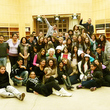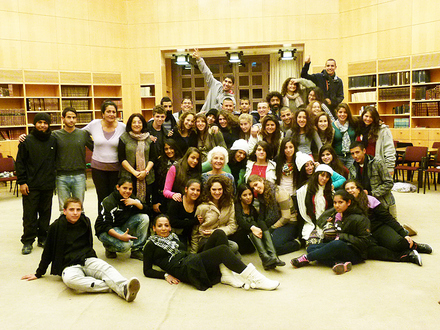Home > Oasis of Peace > Projects & Outreach > Doumia-Sakinah: The Pluralistic Spiritual Centre > Massa-Massar ("Journey") Project Update
Massa-Massar ("Journey") Project Update
Sunday 20 January 2013, by

This school year, partly thanks to a donation from the Global Network of Religions for Children, the Massa Massar (Journey) program continues. The three day leadership workshop was a collaboration between The Pluralistic Spiritual Centre of WAS-NS, The Sulha Peace Project and the Open House in Ramle. Its intention was to provide a platform for open dialogue, leadership training skills and the development of genuine heartfelt connection between 20 Arab and 20 Jewish youth, aged 14-17. The youth came from cities as diverse as Haifa, Ramle, Lod, Modi’in, Jerusalem and WAS-NS itself. The workshop was run in both Hebrew and Arabic.
The first 2 days of the workshop took place in WAS-NS and on the final day there was a tour of key cultural and religious sites in Jerusalem.
The uniqueness of this leadership workshop was felt from the beginning by the introduction of the devoted group of people who worked tirelessly to ensure that the experience would reach the participants in a way that would have a deep and lasting effect. The facilitators were made up of people involved in peace work such as Elad Vazana who has spent the last ten years working on meetings between both sides. It was also facilitated by participants from previous leadership workshops who continued their work when their workshop finished and returned to facilitate the growth of others.
One of these participants, Bissan, age 20 from Ramla described how important it is for her to continuously learn more about those different from her in order to understand ’the other’. ’It is a huge puzzle, you need to know all the pieces to fit it together.’
This combination of the older and younger generations ensured the authenticity of the experience for the participating youth. In intimate group sessions which split the participants into four, it was clear that the facilitators were there not to give the answers, but to ask their questions and to open a space where the youth felt comfortable to bring their own questions and experiences. Together, they explored what it means to be part of a side, to experience discrimination, to overcome their own personal prejudices. The smaller groups provided a safe space for the youth to share their experiences with their peers. Angie, age 16 from Ramla shared how she was here to show that not all Arabs are on the bad side whilst Ofir, a young Jewish girl from Zikhron Ya’aqov explained how she wanted to open her heart in all directions.
The young people brought with them a wide range of experiences in terms of their connection with ‘the other side’, Jewish or Arab. Zoe, age 14 from Pardes Chana was educated in an Arab and Jewish school and felt blessed to grow up with parents who believed it was right to give her the opportunity to meet others and overcome any stereotypes. She came to the weekend to make friends and to interact with her Arab counterparts in a natural way. ’I want my friendships to be natural,’ she said, ’We shouldn’t have to think if someone is Arab or Jewish, just if we get along and want to know each other’.
Andrawes, a 15 year old Christian Arab from Ramla has been going to WAS-NS every Summer for the last 9 years. He also attends the Open House in Ramla once a week and feels that the leadership workshop is very important in order to celebrate being human together. He said, ’It isn’t an option for life to continue the way it is now for Jews and Arabs here. We have to come together to strengthen our connections and understand that everyone is a person, everyone is worthy.’
Vivian Rabiah, an encounter group facilitator who was one of the leaders of the first Massa Massar program, and runs the Open House in Ramla, described how she has had to deal with her experience of being an Israeli Arab and the relationship between the two faiths her whole life. Sometimes it’s hard and overwhelming for her to continuously struggle to make a difference but she feels she doesn’t have a choice. ’There isn’t a difference between my life and my work but I have no other choice. I have to do this.’
The participants stayed together in the hotel at WAS-NS and took part in a tour of the village in which they became better acquainted with the village and its inhabitants. The tour, organized by the young adults of WAS-NS who were part of the team facilitating the workshop, highlighted the spiritual philosophy behind the community concerning the nature of peace. It was explained how they believe that in order to create peace on the outside, it’s essential to create it on the inside too. They took part in creating art out of recycled goods, silent prayer in the peace dome and a gathering in the village café with a founding member of WAS-NS who inspired them further by describing the history of the village and the challenges that were overcome.
On the evening of the first day of the workshop, Elad facilitated a life stories evening, where in an atmosphere of quiet respect, the participants were invited to share a story about their life in any way they wished, a story that has affected them in some way. Surprise was felt by all, as several members of the group opened their hearts sharing their innermost fears and experiences with their peers who they had just met that morning. This was testament to the unique environment that had been created throughout the day, and the evening served as a significant reminder of the human emotions that united the youth as one. Tears were shed for the suffering of others, without a second thought if the suffering was of a Jewish person or of an Arab.
The encounters inspired the children to want to create change. Wahiba, 16 from Ramle plans to study to become a diplomat when she finishes school. ’When I think about everything that has happened, I just want to cry but there’s no point. We need to put it behind us and move forward’. Perri, a 16 year old Jewish boy from Jerusalem felt that the weekend gave him a genuine experience of hanging out with ‘the other side’, having fun together and being young together. He like many of the other participants expressed how he never receives the opportunity to meet with young people who are from ‘the other side’.
On the second day of the workshop, along with delving into the question of stereotypes and the limitations that this creates, the participants took part in physical leadership building activities in the forest. Later in the day the participants were asked to create a timeline, both personal and of their national narrative. This resulted in an in-depth and highly emotional discussion about the conflict, the factors that separate the youth and the parts that bring them together.
Yam, age 16 from Beit Hashmonai felt that the conversation that took part during the timeline activity was very beneficial. ’I’ve always celebrated Israel Independence Day without considering how Arabs feel. Now I understand that we celebrate because whilst they don’t celebrate because. It’s really opened my eyes to another perspective’.
Following on from the discussion, the youth participated in a session with the Parents Circle- Families Forum where they watched a video showing the challenging processes of Jewish and Arab adults taking part in dialogue groups. The day was concluded with tribal drumming and dancing around a fire, singing songs together in Hebrew and Arabic.
On the last day, the youth went together on a tour of Jerusalem, visiting a view point overlooking one the largest Jewish settlement in the West Bank and the Security Wall. They also explored together the three different parts of the old city - Christian, Arab and Jewish. The tour allowed the youth to see the key areas of the other faiths that they had never had a chance to visit. Nicole, a 14 year old Arab teenager from Lod described her excitement at visiting the Western Wall for the first time and how she felt how special it was for the Jewish people. She didn’t want to come to the workshop when she first heard about it. ’I’ve had bad experiences with Jewish people before, there were kids who made me feel bad because I was Arab. I decided to come and it has given me a new perspective that not all Jews are like that. I feel much better about being Arab.’
In the conclusion of the workshop the participants shared their reflections over the last few days. They expressed the uniqueness of the encounters and that they wished that they had the opportunity to meet together in this way more often. Yael, a young Jewish girl from Modi’in expressed how it was strange for her that everyone doesn’t see ‘the other side’ in a positive way like she does. ‘It’s not obvious and it should be’, she said. Dima, a 17 year old Arab girl from Haifa, explained how in Haifa the Jews and the Arabs live peacefully together so she didn’t feel that the workshop would affect her so much. However it made her aware that she also carries pain and she wants to work hard now to overcome the stereotypes in society.
I personally left the workshop feeling inspired and humbled by the youth. I was amazed by their openness and courage to face their own fears and pain and bring all of these feelings to a shared space with those whom they had only recently met. The workshop gave these young people, our leaders of tomorrow, a voice. This voice fills me with hope that there is a way to put the past behind us and move forward with a more positive, humanistic approach. The workshop gave the youth a safe, supported space to connect to and share their experiences, and to feel the humanness that connects them, and us all.
